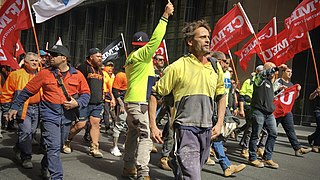Arbitration, in the context of the law of the United States, is a form of alternative dispute resolution. Specifically, arbitration is an alternative to litigation through which the parties to a dispute agree to submit their respective evidence and legal arguments to a neutral third party for resolution. In practice arbitration is generally used as a substitute for litigation, particularly when the judicial process is perceived as too slow, expensive or biased. In some contexts, an arbitrator may be described as an umpire.

Strike action, also called labor strike, labour strike, or simply strike, is a work stoppage caused by the mass refusal of employees to work. A strike usually takes place in response to employee grievances. Strikes became common during the Industrial Revolution, when mass labor became important in factories and mines. As striking became a more common practice, governments were often pushed to act. When government intervention occurred, it was rarely neutral or amicable. Early strikes were often deemed unlawful conspiracies or anti-competitive cartel action and many were subject to massive legal repression by state police, federal military power, and federal courts. Many Western nations legalized striking under certain conditions in the late 19th and early 20th centuries.

Driving under the influence (DUI) is the offense of driving, operating, or being in control of a vehicle while impaired by alcohol or drugs, to a level that renders the driver incapable of operating a motor vehicle safely. Multiple other terms are used for the offense in various jurisdictions.
Same-sex adoption is the adoption of children by same-sex couples. It may take the form of a joint adoption by the couple, or of the adoption by one partner of the other's biological child.
In the 1980s and 1990s there were, in the Paris region (Île-de-France), multiple instances of alleged and proved political corruption cases, as well as cases of abuse of public money and resources. Almost all involved were members of the conservative Rally for the Republic (RPR) ruling party, which became the Union for a Popular Movement (UMP) in 2002.
Stephen Paul Cannane is a news journalist and current affairs reporter for the Australian Broadcasting Corporation. He is the chief of the ABC's Europe bureau, based in London. Cannane had previously been the ABC's Europe correspondent, a reporter for the ABC's Investigations unit, a host of The Drum and a reporter at Lateline.
Equal pay for equal work is the concept of labour rights that individuals in the same workplace be given equal pay. It is most commonly used in the context of sexual discrimination, in relation to the gender pay gap. Equal pay relates to the full range of payments and benefits, including basic pay, non-salary payments, bonuses and allowances. Some countries have moved faster than others in addressing equal pay.

The Supreme Court of Ukraine is the highest judicial body in the system of courts of general jurisdiction in Ukraine.
An unfair labor practice (ULP) in United States labor law refers to certain actions taken by employers or unions that violate the National Labor Relations Act of 1935 29 U.S.C. § 151–169 and other legislation. Such acts are investigated by the National Labor Relations Board (NLRB).

Alcohol advertising is the promotion of alcoholic beverages by alcohol producers through a variety of media. Along with nicotine advertising, alcohol advertising is one of the most highly regulated forms of marketing. Some or all forms of alcohol advertising are banned in some countries. There have been some important studies about alcohol advertising published, such as J.P. Nelson's in 2000.
A prude is a person who is described as being concerned with decorum or propriety, significantly in excess of normal prevailing standards. They may be perceived as being more uncomfortable than most with sexuality or nudity.

The Supreme Court of Cassation is the highest court of appeal or court of last resort in Italy. It has its seat in the Palace of Justice, Rome.
In contract law, a non-compete clause, restrictive covenant, or covenant not to compete (CNC), is a clause under which one party agrees not to enter into or start a similar profession or trade in competition against another party. Some courts refer to these as "restrictive covenants". As a contract provision, a CNC is bound by traditional contract requirements including the consideration doctrine.
Since its invention by John Stith Pemberton in 1886, criticisms of Coca-Cola as a product, and of the business practices of The Coca-Cola Company have been significant. The Coca-Cola Company is the largest soft drink company in the world, distributing over 500 different products. Since the early 2000s, the criticism of the use of Coca-Cola products, as well as the company itself, escalated, with criticism leveled at the company over health effects, environmental issues, animal testing, economic business practices and employee issues. The Coca-Cola Company has been faced with multiple lawsuits concerning the various criticisms.

Philippe Karsenty is a French politician and founder of Media-Ratings, a company monitoring the French media for bias. Karsenty came to public attention when he was sued for libel by the public French television network, France 2, over accusations of staged footage by France 2 over the killing of a 12-year-old Palestinian boy, Muhammad al-Durrah. The libel suit lasted a decade, with the ultimate verdict being against Karsenty and requiring him to pay damages to France 2.
French labour law is the system of labour law operating in France.
Dry January is a campaign delivered by Alcohol Change UK where people sign up to abstain from alcohol for the month of January. The term "Dry January" is a registered trademark with Alcohol Change UK and was first registered in 2014.
The right to disconnect is a proposed human right regarding the ability of people to disconnect from work and primarily not to engage in work-related electronic communications such as e-mails or messages during non-work hours. The modern working environment has been drastically changed by new communication and information technologies. The boundary between work life and home life has shrunk with the introduction of digital tools into employment. While digital tools bring flexibility and freedom to employees they also can create an absence of limits, leading to excessive interference in the private lives of employees. Several countries, primarily in Europe, have some form of the right to disconnect included in their law, while in some cases it is present in the policy of many large companies.

The General Alliance against Racism and for Respect for French and Christian Identity is a French organization tied to the far-right and Catholic integralism that fights against speech it considers to violate French hate speech laws by being hateful towards Christians or the French people. Recognized as an anti racism organization by the French court system, the organization has brought several cases before court and won a few cases in the Court of Cassation in the 1990s, but has had little legal success more recently. On February 14th, 2023, the Global Project Against Hate and Extremism (GPAHE) released a report in which it classified l'AGRIF as an "anti-muslim" group.
Vincenzo Vecchi is an Italian "altermondialist".







